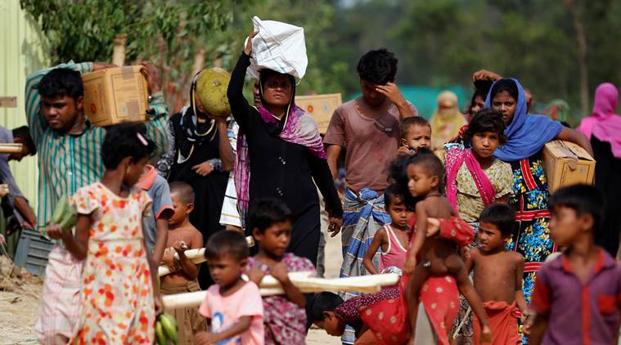
Centre to rehabilitate 1,080 Rohingya refugees in Delhi

The Centre has India has decided to rehabilitate around 1,000 Rohingyas currently staying in makeshift camps in New Delhi, a decision taken with a pinch of salt by Rohingya groups and rights bodies.
Following pressure from Delhi state government, the home ministry, in a meeting with the state government and police authorities last month, decided to provide shelter to the Myanmar’s refuges at New Delhi Municipal Council (NDMC) flats in Bakkarwala village in West Delhi.
Delhi has a Rohingya population of 1,080, according to a 2018 survey. They stay at makeshift tent camps in four localities. They are all registered as refugees with the United Nations High Commissioner for Refugees (UNHCR).
Also read: Rohingyas in India fleeing to Bangladesh for safety and refuge
According to data available with the Rohingya Human Rights Initiative (RHRI), 93 families are staying at the camp in Shaheen Bagh, 55 families in Madanpur Khadar, 76 families in Khajuri Khas and 43 in Vikaspuri.
Families in different parts of Delhi
The new accommodation for these families was discussed at a high-level meeting chief secretary of Delhi Naresh Kumar held with officials of the home ministry and Delhi Police in the last week of July, sources in the MHA informed The Federal.
In the meeting, the Delhi government pointed out that it has been spending over Rs 7 lakh per month as rent of the tents used in the makeshift refugee camps for the community. The Delhi Police also reportedly conveyed in the meeting that it would be easier to keep a tab on the Rohingyas if their entire population in Delhi is housed in one place.
The meeting decided to allocate 250 NDMC flats at Bakkarwala village to the 267 Rohingya families. The flats are meant for economically weaker sections. The Delhi government will provide electricity, water supply, recreation facilities for the rehabilitated families while Delhi Police will provide security.
The social welfare department of Delhi will also provide three meals to the residents, sources said.
While welcoming the move, Sabber Kyaw Min, founder and director of Rohingya Human Rights Initiative, said the new Bakkarwala village campus for the Rohingyas should not be turned into a detention camp.
Sceptical of the move
“We have heard about the decision from sources only, as you have got to know. But neither the Delhi government nor the Centre has informed anything to us or those living in the camps. Even the UNHCR is not intimated, making us a little sceptical about the move,” Kyaw Min said.
He said the decision to provide free meals would naturally raise doubt whether the residents of the camps would be allowed to earn their livelihood freely as they have been currently doing. Kyaw Min pointed out that Rohingya refugees were in the past also shifted from one camp to another. But he admitted that never in the past, the government offered any permanent rehabilitation package.
Also read: Rohingya refugees could turn to extremism, says Bangladesh minister; seeks India’s help
“We hope that the police protection does not turn into unlawful surveillance and accommodation into arbitrary detention,” said Kyaw Min. He added that currently the Rohingya community lives in dire conditions. They lack proper places to sleep, clean and adequate sanitation facilities and access to medical treatment. Inadequate identity documentation has also left them at the mercy of Indian authorities who have deported at least 17 Rohingyas to Myanmar since 2018 despite holding UNHCR refugee cards or person of interest documents.
“We hope that India also stands in solidarity with the Rohingyas internationally and calls on the Myanmar government to stop the apartheid against Rohingya,” he said.
Suhas Chakma, director, Asian Centre for Human Rights, said the decision could be just to pre-empt any criticism on refugee issues. “India continues with adhoc policy on refugees. If it’s serious on refugees, it would have enacted a refugee law or allow UNHCR to operate across the country, including in North-East,” he said.
“India will also have to release all other refugees, including Rohingyas who are in detention at present. Otherwise, this specific decision will not bring any change to India’s hostile policy on refugees,” Chakma added.


